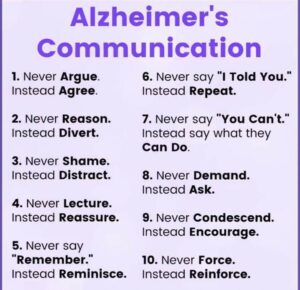A monthly article brought to you by Senior Services Memory Support Programs
We have learned a lot about the various types of dementia including signs and symptoms to look for, the differences between the types and much more. Now it’s important to understand how to communicate effectively with a loved one who is having memory changes.
Communication between two people is not always about the words that we say. It also includes many other processes in our brain such as reading non-verbal signals, comprehension, perception, attention and short term memory. So what can we do to improve our communication with someone who is living with dementia? Let’s take a look at some tips and suggestions.
 We often think of verbal communication as being the most important form, however, non-verbal communication amounts to 75% of understood communication. People living with dementia rely heavily on non-verbal cues. It is important to keep in mind what your body language might be telling the person with dementia.
We often think of verbal communication as being the most important form, however, non-verbal communication amounts to 75% of understood communication. People living with dementia rely heavily on non-verbal cues. It is important to keep in mind what your body language might be telling the person with dementia.
Try to be cognizant of the surrounding environment and if it could hinder communication. Ask yourself, is there too much noise or other distractions? Is the lighting poor? Is the space cluttered? Is the space familiar to the person? All of these factors might affect how someone comprehends what you are telling them.
When speaking with someone with dementia, it’s important to respect their preferences. You should always use the person’s preferred name. This may change as the disease progresses. For example, you may have always called your mother “mom”, but now she might not recognize this as her role and may prefer to be called by her first name.
Next, making a good first impression sets the tone for successful communication. With short term memory loss, each interaction can feel like the first meeting, even if it is not true. Always initiate interaction with a smile. Facial expressions are often mimicked and can set the tone for the conversation. Always approach the person from the front. Oftentimes, people experience peripheral vision changes that can prevent the person from seeing you approach on the side.
When having a conversation, keep your language simple by using short and direct phrases. Just remember that the person who you are speaking with may not understand what you are asking them or how to answer your question. Their answer may not be what you were looking for or expecting. If the person is struggling to answer you, there are a few things you may try. Make sure to include enough clues to help them. Don’t let them hang out on a limb for too long so that they get frustrated. If they don’t recall, change the subject or causally answer the question yourself. Be sure to ask for their opinions, but avoid quizzing them. Most importantly, have patience!
You might try offering statements versus questions as many people will answer with “no” instead of “yes” when given the option. For example, when you want the person to do a certain task simply say, “Come with me,” while using a hand gesture. If the person is adamantly saying “no,” respect their refusal and try again later.

In the past, the method of “reality orientation” was used. This means to orient the person to the true reality. However, over time we have learned a lot about dementia and know that this method can be very frustrating, confusing and upsetting to those with memory loss. If the person you are speaking with thinks that it’s the year 1987, but in reality we know that it is 2023, just go with it. Never argue or confront a person living with dementia. Join their reality and try to ask yourself, “Who is this a problem for? The person or for me?”
Many family caregivers report that they can become frustrated with their loved one if they have to repeat information. They may say things such as, “I just told you that” or “You have asked me that 100 times already.” Just remember that the person living with dementia is not trying to frustrate you, they truly do not remember.
When you start to notice memory changes, seeking early detection is key. Senior Services offers an array of memory support programs including confidential memory screenings to obtain a cognitive baseline, early memory loss programs, and educational classes along with support from Seasons Adult Day Health Services. If you or someone you know is experiencing increasing changes with their memory and could benefit from additional services, please contact Amy Sheridan, Family Support and Activity Manager at 989-633-3764.
Check out our section, Our Mind Matters, next month as we will share useful communication tips and strategies when speaking with someone with dementia.

